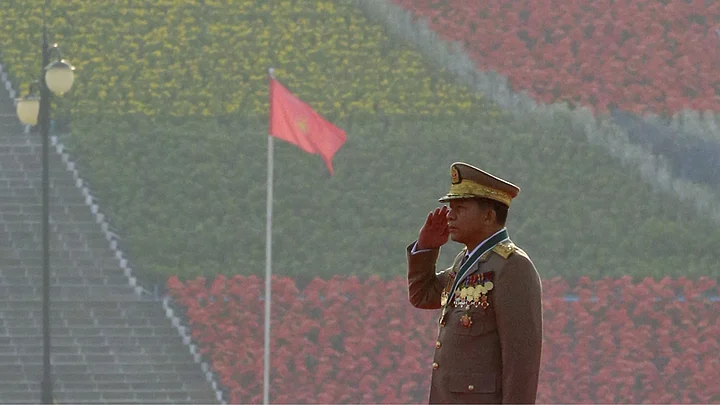The Tatmadaw’s Calculations
- The Tatmadaw (army) has promised to “respect” outcome of November 8 parliamentary polls
- That cuts out the possibility of the army not accepting the poll verdict
- Promise scotches predictions that the army may prevent the polls from taking place
- Army is sure to retain its say in running the nation
- Army’s success in stalling three suggested constitutional amendments has given it confidence to accept any poll verdict
- It is also sure that Aung Sang Suu Kyi’s National League for Democracy cannot sweep the polls
Having stalled efforts to change the 2008 constitution that gives the military a 25% representation in the national parliament, Myanmar’s Tatmadaw (army) has now promised to “respect” the outcome of the November 8 parliamentary polls.
“The army will respect the outcome of the elections but not step back from politics,” its commander-in-chief senior General Min Aung Hlaing told the BBC in an interview broadcast on July 20.
That cuts out the possibility of the army not accepting the poll verdict, as they did in 1990, and seizing power as they did 25 years ago when Aung Sang Suu Kyi’s National League for Democracy (NLD) won a landslide victory.
General Hlaing’s reassurance that the army will accept the poll outcome and that the “elections will be free and fair” also seems to scotch predictions that the army may finally prevent the polls from taking place, as suggested by at least two top Myanmar watchers, Bertil Lintner and Larry Jagan.
Unpredictable Situation
“But when faced with towering figures like Jagan and Lintner, it is best to genuflect and concede that the Myanmar polls are a chiaroscuro painted in porridge – frankly, we don’t know what’s going to happen,” wrote veteran columnist Roger Mitton recently.
So why is the Myanmar army willing to accept a poll outcome? Jagan and Lintner are right to assume that the army has not changed and taken to the inevitability of a democratic transition.
But they are wrong to assume they may block the polls because they have no reason to. As an institution, the Myanmar army is sure to retain its say in running the nation.
The Army’s Confidence
The army’s success in stalling three suggested constitutional amendments has given it the confidence to accept any poll verdict.
The amendments had sought to nullify provisions that gives the army 25% representation in parliament and control over three crucial ministries of defence, home and border affairs. Another provision prevents anyone with close foreign relatives from running for presidency.
After the amendments were shot down, the army is sure that the NLD may win the elections but Aung Sang Suu Kyi will not be president or vice-president.
They are also sure that the NLD cannot sweep the polls to marshal a 75% majority needed to change the constitution.
Another General is Ready
Even if President U Thein Sein steps aside and does not run for presidency a second time, another general Thura Shwe Mann, currently speaker of the lower house, will step forward to contest.
Mann is said to be in good terms with the “Lady” as Suu Kyi is referred to in the Tatmadaw – so there is a possibility that the top brass will find someone else from their ranks to shed the uniform and run to replace Thein Sein.
Why should the army disregard the poll verdict now as it did in 1990?
They are sure to have a general as president to run the country from the top, they are worried about adverse global reaction if the army tried a 1990 style upturning and they are sure that the NLD cannot change the constitution.
With control over key departments like home, defence and border affairs (also foreign affairs indirectly), the army has enough hold over the political system.
NLD’s Fate
It is also encouraged by poll predictions that suggests the NLD is not likely to sweep the polls as they did in 1990 or during the 2012 by-elections when it won 43 of the 44 seats.
In the regions suffering from ethnic conflicts – like Rakhine, Shan, Kachin and Karen states – a slew of regional parties representing different ethnic aspirations may take away a substantial percentage of seats, leaving the NLD behind.
Veteran Myanmar watchers are not giving the NLD more than 60% seats this time – some say it could drop to 40%.
So apart from justifying the army’s continued involvement in politics to preserve national unity, the ethnic conflicts serve the military a greater purpose – deny Aung Sang Suu Kyi’s NLD a free run of the seats in key states.
The rebels fight the army and help it raise the bogey of compromising national unity. The conflict strengthens regional parties who slice into the NLD vote share, so that ensures the Tatmadaw does not have to deal with a national party that has a massive mandate.
This means the 2008 constitution remains unchanged and with it the army’s stranglehold on power. This is democracy in the shadow of the uniform – if not the gun.
(Subir Bhaumik, a veteran BBC correspondent, is author of two highly acclaimed books on Northeast India – ‘Insurgent Crossfire’ and Troubled Periphery’)
(At The Quint, we question everything. Play an active role in shaping our journalism by becoming a member today.)
